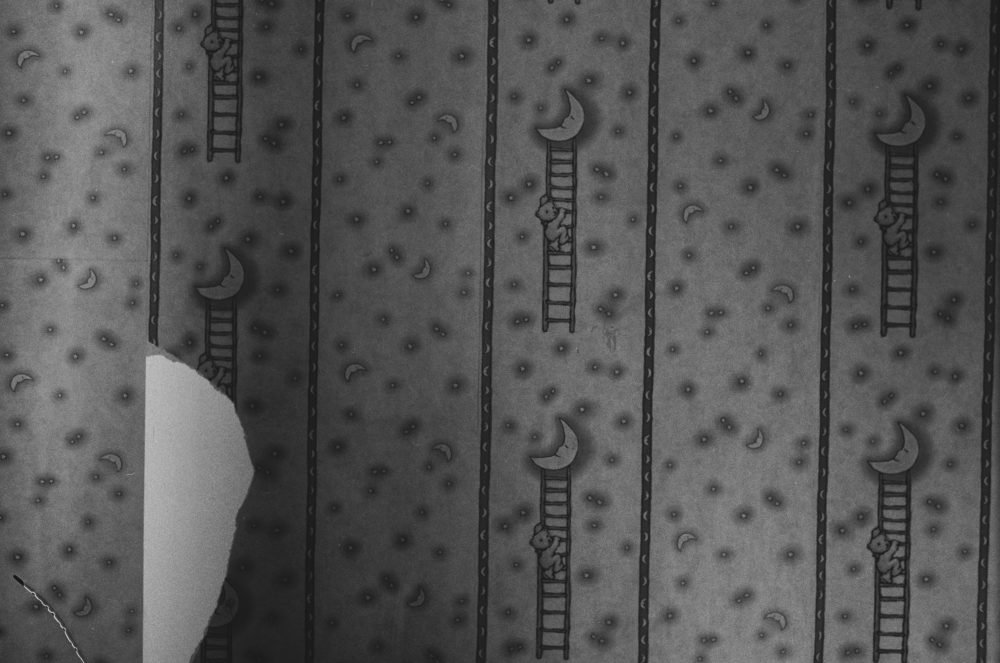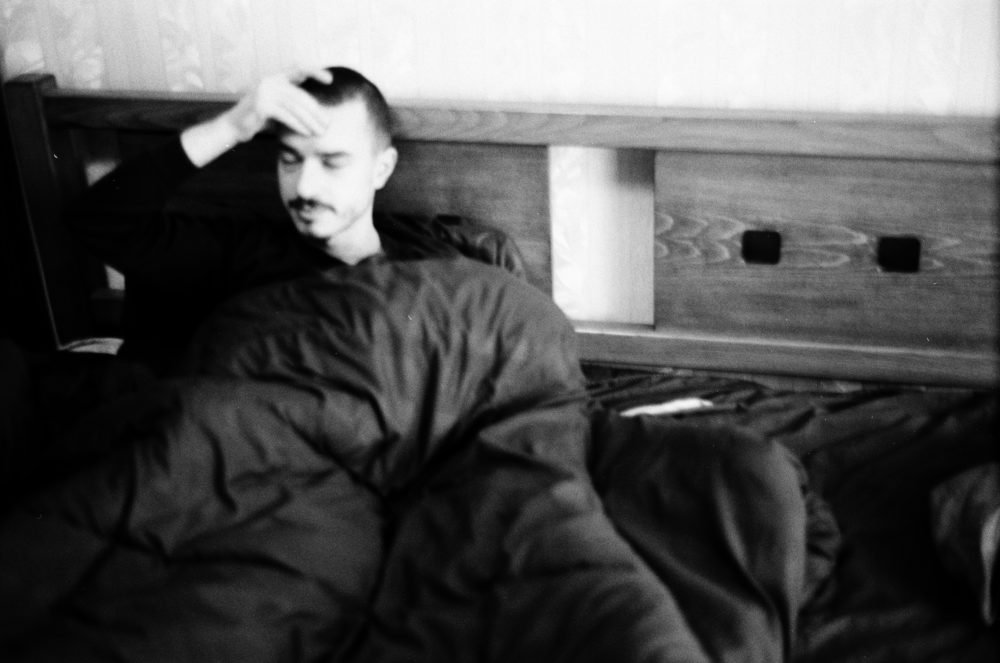
Armen and Volodymyr have been living on one of Yerevan’s oldest streets for more than a year. A four-year-long relationship between them had to endure an emotional rollercoaster due to the wars in Nagorno-Karabakh and Ukraine. As the end of political turmoil is yet to come in both Armenia and Ukraine, the queer couple has learned to live without attaching their life to the territory, but rather to each other.
Life in Kyiv and the second Nagorno Karabakh War
Armen, 32, a communication and management specialist, and Volodymyr, 28, an SMM specialist, met in Kyiv in 2019 while visiting their mutual friend. The spark between the two flared immediately; from the very first moment they were laughing, making jokes, and as they recall, they were on the same wavelength. However, Volodymyr was reluctant to share his Instagram account. He had just gone through a bad breakup and wanted to leave for Italy where his parents lived. He did not need any new attachments.
“Eventually I just stole his phone and followed my own page via his Instagram account,” Armen laughs while telling this story.
They ended up celebrating Easter together twice that year, by the Armenian Apostolic Church and the Orthodox calendars. They have celebrated every Easter together since then.
Moving to Kyiv had been Armen’s dream since 2014 when he visited Ukraine for the first time. “Ukraine has always been close to my heart, I just love it. I always find peace there. The next time I traveled to Ukraine to participate in Kyiv Pride. In 2016, I traveled to Ukraine over 20 times and that’s when I decided that I want to live there,” Armen said.
A shared history of the Soviet past doesn’t help the couple understand each other better, as it may seem at first. However, as Armen says, they are united by their common aversion to Soviet culture and the negative influence of the Soviet empire.
“Soviet culture is often stigmatized. Of course, it’s okay to admire architectural examples from that era, but when people start to remember those days with nostalgia and say something like ‘Oh, such things never happened in the USSR…’ I can’t take it,” Volodymyr said.
On the other hand, Armenian and Ukrainian cultures often clash in their relationship.
“The differences in mentality are huge. When I try to explain to Armen something he understands it from his prism, and unknowingly says something that hurts or upsets me because…”
“Because it’s not like that in our culture,” Armen continues Volodymyr’s thought.
Both Armen and Volodymyr agree that even saying “I love you” to each other for the first time was affected by their cultural background. Volodymyr admits that he felt pressured by Armen to say it.
“The most important thing for me was to show by my actions how I love him. Not just say it. That’s what I saw in my family. I don’t remember my mother telling me that she loves us, although she would do everything for us.” said Volodymyr.
Armen, on the other hand, says that saying the words are as important for him as showing it. “Probably the cultural background plays its role. Maybe it’s an exaggeration but we are used to making loud statements but we do not always do as we say. This attitude is reflected in politics and in social life, too,” he says.
The couple was still based in Kyiv when the war broke out in Nagorno-Karabakh in 2020.
Armen says during the war the bond between him and VVolodymyr became even stronger due to the support he received from his partner. “I supported Armenia not because Armen is my partner. We have already seen war in 2014 and what came after when many people were forced to leave their homes. That’s not how people must be treated. We live in a civilized world where we can simply talk and find solutions. Talking is a thousand times cheaper than war,” said Volodymyr.
In the first days, Armen was in a state of shock and couldn’t cope with what he saw in his daily peaceful life in Kyiv and what was actually happening in Nagorno-Karabakh and on the borders of Armenia. “On one hand, life goes on, but at the same time, you know that life has stopped in Armenia. It was difficult to live with that feeling.”
Moving to Yerevan and the war in Ukraine
Armen had to cope with the war happening in his country while being in Kyiv, a much safer place at the time, while two years later Volodymyr had to face the same circumstances.
In 2022, Armen was offered a job in Pink Armenia, a community-based LGBT organization. He asked Volodymyr if he minded going to Yerevan. “Why not? Let’s go,” he replied. “I thought he was joking,” Armen says.
They arrived in Yerevan a few weeks before the Russian invasion of Ukraine on February 24th, 2022. Early that morning, Armen was the first one to hear the news about the war, but decided not to wake Volodymyr up early. He did not know how to tell him.
Volodymyr himself cannot remember the first days of the war. “I didn’t exist physically. People were walking in the street, shopping, and all I wanted to do was to cry. I was grateful that I was in a safe place. But I knew that millions of people were in danger at that moment.”
Moreover, many people in Armenia had pro-Russian or anti-Ukrainian positions. During and after the war in Nagorno-Karabakh, the Armenian media and political movements blamed Ukraine for supporting Azerbaijan.
“It’s sad when the whole world doesn’t scream when you need it and screams when someone else needs it,” Armen says, but at the same time he is sure it is important to let go of the bitterness left after the Nagorno Karabakh war and take the human side.
Armen and Volodymyr spent the first weeks of the invasion following the news and constantly subscribing to new channels every day. But at some point, they had to stop as it had a negative influence on their mental health.
As for now, concentrating on work and working on three to four projects help the couple to fight the stress of the war. Both of them support organizations that help Ukrainian refugees and those who remain in the country.
Uncertainty and future
When asked if it is possible to live in Armenia as a gay couple, Armen smiles. “As you see we live here. So it is possible.”
Later he explains that there are some conditions; they do not hold hands or show signs of affection in public because it is a matter of their security. Although they think that people in stores and other places understand the nature of their relationship because they behave like a couple. “We can be free only in some places and in that sense we created our own bubble. We definitely felt freer in Kyiv. No one asked inappropriate questions, they didn’t care about our personal life or what we look like,” said Armen.
Volodymyr does not agree with Armen. In a short period of time, he created a special bond with the Armenian LGBT community. He says people in Yerevan are open and friendly, and the younger generation of queer people seem extremely brave to him.
There is only one thing that is certain for the couple. Home is where they are together.
“It is such a feeling that you are in a sprint, you are running, you are exhausted, but you keep running and at the same time you think that you should not despair, you should develop. I want life to go forward because you run, run, run and you know that the doors will open and that magical day will begin when the war is over, and only then the future will begin,” said Volodymyr.






